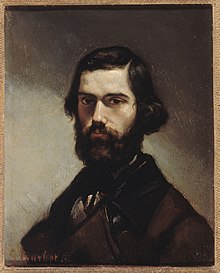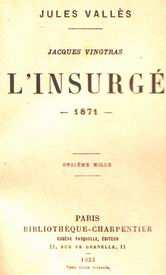Jules Vallès

Jules Vallès (* 11. June 1832 in Puy-en-Velay , Haute-Loire , † 14. February 1885 in Paris ) was a French journalist , novel writer , publicist and social and literary critic . The insurgent and elected representative of the Paris Commune went into exile in London in 1871 , where he stayed until 1880 in order to avoid the execution of the death sentence pronounced against him in absentia (July 14, 1872).
He was editor of the mostly short-lived magazines La Rue (1867), Journal de Sainte-Pélagie (1868), Le Peuple (1869), Le Réfractaire (3 issues) and Le Cri du Peuple (1871).
Life
Jules Vallès was born the son of elementary school teacher Louis Vallès, who had married a poor, uneducated country girl. Of the seven children raised by the couple with great discipline and extreme severity, two survived. Due to the dismissal and several changes of position of his father, Jules Vallès spent his youth partly in Saint-Étienne and from 1846 in Nantes , where, when the Second Republic was proclaimed (1848), to the annoyance of his father, he launched an extremist movement that called the Abolition of the school leaving certificate and all diplomas demanded. Temporarily sent to the Lycée Bonaparte (today Lycée Condorcet ) in Paris, he failed his Abitur examination in Nantes, fell out with his father and returned to Paris, where he was enthusiastic about the ideas of Pierre-Joseph Proudhon , the most famous French socialist at the time and was one of the leaders of the uproar over Jules Michelet's dismissal from the Collège de France . After the coup d'état of Louis Napoleon Bonapartes (December 2, 1851), which led to bloody fighting all over France, Father Vallès, worried about his own situation and above all about his teaching post, called the compromising son back to Nantes. Admitted December 1851 to a mental hospital under the pretext of insanity, where he remained interned until March 2nd.
Soon after, Jules Vallès became secretary to the literary critic Gustave Planche and published his first work in 1857: L'argent . At the same time he wrote for various newspapers such as Le Figaro , L'Événement and Liberté , which he repeatedly convicted (source?) For his vehement attacks against the bourgeoisie . Temporarily he was also an officer of the police prefecture (source?) And founded the magazine La Rue in 1867 , which was soon suppressed by the police.
After September 4, 1870, he was accepted into the International, became chief of a battalion of the National Guard and, as such, participated in all mutinies during the siege of Paris. After the capitulation of the city he founded the paper: Le Cri du Peuple (The People's Call), the official organ of the heads of the National Guard, and was elected a member of the Paris Commune after the uprising of March 18, 1871 . After the troops entered Versailles , he managed to escape to London , from where he worked for the socialist journal La Resolution francaise . In France, however, he was sentenced to death in absentia.
After the amnesty of July 1880, he returned to Paris and made a living from his literary work.
Jules Vallès died on February 14, 1885 at the age of 52 in his apartment in Paris (77 Boulevard Saint-Michel). When the coffin - covered with the red silk sash that Vallès had carried as a member of the commune - was carried out of the house on February 16 at noon, a crowd of around 10,000 people had gathered in front of it. The funeral procession to the Père-Lachaise cemetery followed, behind the family members of the deceased, Henri Rochefort , the MPs Antoine Révillon , Clovis Hugues and Georges Laguerre , former members of the commune in Paris such as Charles Amouroux , Augustin Avrial , Arnaud, Henri-Louis Champy , Frédéric Cournet , Louis-Simon Dereure , Clovis Dupont , Émile Eudes , Gérardin, François Jourde , Charles Longuet , Benoït Malon , Jules Martelet , Eugène Pottier , Dominique Regère , Raoul Urbain , Édouard Vaillant , Auguste Viard , and various delegations. Red flags were unfurled and on the way the shouts of "Vive la Commune! Vive la révolution sociale! Vive l'anarchy!" Several incidents occurred due to a wreath donated by the German socialists. The police did not intervene. The funeral oration was made by Henri Rochefort. In 1914, the tomb was decorated with a portrait bust by the sculptor Jean Carlus .
Jules Vallès wrote about his work:
- I have not analyzed how this is taught at the Sorbonne, whether my prose resembles Pascal or Marmontel or Juvenal or Saint-Simon or Saint-Beuve. I neither observe the sequence of times with all correctness, nor am I afraid of new formations. Moreover, I generously disregard any academic order in the application of parables. I grab scraps of my life and sew them together with the other. When I feel like it, I laugh, when humble memories run through my bone and bone, I grind my teeth.
His dedications to the autobiographical trilogy Jacques Vingtras
- ›The Child‹: everyone who died of boredom in school or who cried at home, who were bullied by their teachers in childhood or beaten by their parents.
- ›Education‹ bears the following dedication: I dedicate this book to those who were fed with Greek and Latin and died of hunger.
- Vallès dedicated 'The Revolt': To the dead of 1871. I dedicate this book to everyone who, as victims of social injustice, took up arms against a poorly organized world and formed the great federation of pain under the banner of the commune.
Factory selection
Jacques Vingtras
- 1879: L'Enfant , first published in Le Siècle in 1878
- 1881: Le Bachelier , first published in 1879 under the title Mémoires d'un révolté
- 1886: L'Insurgé unfinished, published posthumously by his companion Caroline Rémy (called Séverine) (German: Die Revolte ; also The Rebellion or Story of an Insurgent )
Translations into German
- 1895 in free editing of the material by Karl Schneidt Vingtras Junge Leiden ( L'Enfant ) Berlin: Association for free writing (sic)
- 1951 Complete edition, translated by Gerhard W. Schlichtkrull, Hamburg: Claassen Verlag
- 1964 complete edition, translated by Horst Wolf. Weimar: Gustav Kiepenheuer Verlag
- 1971 The Riot , translated by Renate Vogt, Kristina Hering, Helgard Rost, Roland Erb. Ed. Rudolf Noack, Introduction pp. 5–27. Appendix pp. 309–331. Leipzig: Reclam publishing house
- 1979 Complete edition, translated by Christa Hunscha. Afterword by the translator, pp. 931–936. Frankfurt am Main: March at two thousand and one ; New edition: Erftstadt: Area 2004 ISBN 3-89996-029-7
Other works
- 1866: Les refractaires (collection of older texts published in the Le Figaro newspaper )
- 1946 German transl. Thomas W. Schlichtkrull under the title Die Abwegigen Claassen & Goverts; identical to 2nd edition, Nautilus 1980
- 1869: Un Gentilhomme , feuilleton novel
- 1879: Les Enfants du Peuple , La Lanterne
- 1880: Les Blouses feature novel , published in La Justice
- 1882: Les chroniques de l'homme masque , collected contributions to Voltaire
- 1883: La Rue à Londres
literature
- Germaine Frigot: Jules Valles: Bibliography . Mairie de Paris, Direction des Affaires Culturelles, Paris 1985 ISBN 2-86903-007-X
- Max Gallo : Jules Vallès ou la révolte d'une vie . Laffont, Paris 1988
- André Lagarde & Laurent Michard: La Littérature Française . Bordas & Laffont, Paris 1972
- Rachael Langford: Jules Vallès and the narration of history. Contesting the French Third Republic in the Jacques Vingtras trilogy . Series: French studies of the 18th and 19th centuries Vol. 3. Peter Lang, Bern 1999 ISBN 3-906762-99-8 & ISBN 0-8204-4249-6
- Arno Münster : The subject of revolt in the work of Jules Vallès. A contribution to the sociology of commune literature. Series: Freiburg writings on Romance philology, 25. Fink, Munich 1974 ISBN 377050819X
- Hermann Wendel : Jules Vallès . In: The New Time . Weekly of the German Social Democracy . Volume 31 (1912-1913), Volume 1 (1913), Issue 56, pp. 105-111. FES
Web links
- Literature by and about Jules Vallès in the catalog of the German National Library
- Archive of the TAZ, by Thomas Ebermann
- In detail about the Vingtras trilogy, 2005, by Th. Ebermann
- Reading of selected writings and a. by Th. Ebermann
-
MP3 audio from L'enfant (in French) excerpt, chap. 1
- ditto, Le bachelier extract, chap. 1 in French
- ditto, L'insurgé excerpt chap. 1 in French
- L'ours Audio: ( Ger. The Bear ), a little-known text by the author, cpl. in French
- Horst Laube, review of the trilogy in Der Spiegel No. 6 v. 4th February 1980
- various materials at Schröder & Calendar , epilogue of the translator Christa Hunscha's trilogy; Cover of the French first edition; March edition: Facsimile of pp. 843–848 and pp. 854–857; further excerpts and summaries (part 1 of 2)
Footnotes
- ↑ The title follows the spelling of the 19th century
- ↑ "Long live the commune! Long live the social revolution! Long live anarchy!"
- ↑ See obituary in Le Monde Illustré of February 21, 1885
- ↑ As a volume in: The Great March Cassette Ed. Jörg Schröder and Bruno Hof
- ↑ Issues mostly without ISBN
| personal data | |
|---|---|
| SURNAME | Vallès, Jules |
| ALTERNATIVE NAMES | Vingtras, Jacques (pseudonym) |
| BRIEF DESCRIPTION | French publicist, novelist, revolutionary and journalist |
| DATE OF BIRTH | June 11, 1832 |
| PLACE OF BIRTH | Puy-en-Velay , Haute-Loire department |
| DATE OF DEATH | February 14, 1885 |
| Place of death | Paris |

